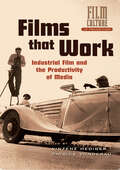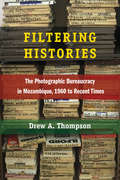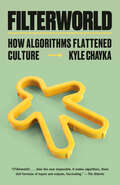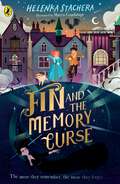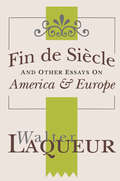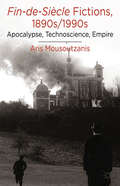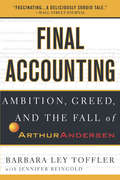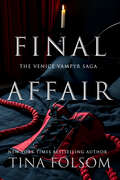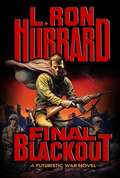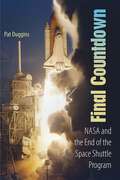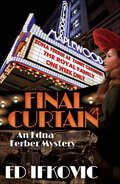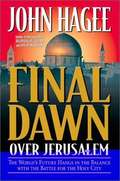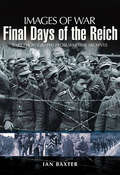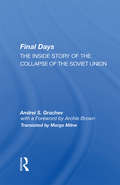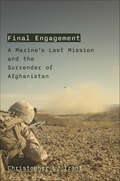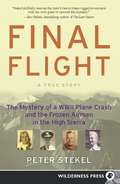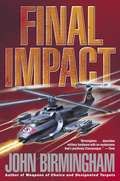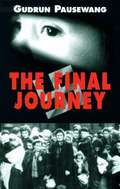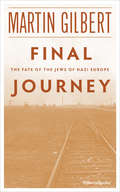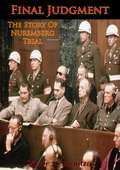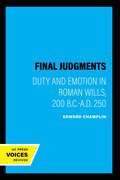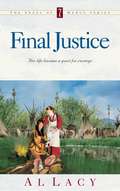- Table View
- List View
Films that Work: Industrial Film and the Productivity of Media (Film Culture in Transition)
by Patrick Vonderau Vinzenz HedigerThe history of industrial films – an orphan genre of twentieth-century cinema composed of government-produced and industrially sponsored movies that sought to achieve the goals of their sponsors, rather than the creative artists involved –seems to have left no trace in filmic cultural discourse. At its height the industrial film industry employed thousands, produced several trade journals and festival circuits, engaged with giants of twentieth-century industry like Shell and AT & T, and featured the talents of iconic actors and directors such as Buster Keaton, John Grierson and Alain Resnais. This is the first full-length book, anthology, and annotated bibliography to analyse the industrial film and its remarkable history. Exploring thepotential of the industrial film to uncoverrenewed and unexplored areas of media studies, this remarkable volume brings together renowned scholars such as Rick Prelinger and Thomas Elsaesser in a discussion of the radical potential and new possibilities in considering the history of this unexplored corporate medium.
Filtering Histories: The Photographic Bureaucracy in Mozambique, 1960 to Recent Times (African Perspectives)
by Drew A. ThompsonPhotographers and their images were critical to the making of Mozambique, first as a colony of Portugal and then as independent nation at war with apartheid in South Africa. When the Mozambique Liberation Front came to power, it invested substantial human and financial resources in institutional structures involving photography, and used them to insert the nation into global debates over photography's use. The materiality of the photographs created had effects that neither the colonial nor postcolonial state could have imagined. Filtering Histories: The Photographic Bureaucracy in Mozambique, 1960 to Recent Times tells a history of photography alongside state formation to understand the process of decolonization and state development after colonial rule. At the center of analysis are an array of photographic and illustrated materials from Mozambique, South Africa, Portugal, and Italy. Thompson recreates through oral histories and archival research the procedures and regulations that engulfed the practice and circulation of photography. If photographers and media bureaucracy were proactive in placing images of Mozambique in international news, Mozambicans were agents of self-representation, especially when it came to appearing or disappearing before the camera lens. Drawing attention to the multiple images that one published photograph may conceal, Filtering Histories introduces the popular and material formations of portraiture and photojournalism that informed photography's production, circulation, and archiving in a place like Mozambique. The book reveals how the use of photography by the colonial state and the liberation movement overlapped, and the role that photography played in the transition of power from colonialism to independence.
Filterworld: How Algorithms Flattened Culture
by Kyle ChaykaA MOST ANTICIPATED BOOK • From New Yorker staff writer and author of The Longing for Less Kyle Chayka comes a timely history and investigation of a world ruled by algorithms, which determine the shape of culture itself."[Filterworld] is about how algorithms changed culture…[Chayka asks] what is taste? What is a sense of aesthetics? And what happens to it when it collides with the homogenizing digital reality in which we now live."—Ezra KleinFrom trendy restaurants to city grids, to TikTok and Netflix feeds the world round, algorithmic recommendations dictate our experiences and choices. The algorithm is present in the familiar neon signs and exposed brick of Internet cafes, be it in Nairobi or Portland, and the skeletal, modern furniture of Airbnbs in cities big and small. Over the last decade, this network of mathematically determined decisions has taken over, almost unnoticed—informing the songs we listen to, the friends with whom we stay in touch—as we&’ve grown increasingly accustomed to our insipid new normal.This ever-tightening web woven by algorithms is called &“Filterworld.&” Kyle Chayka shows us how online and offline spaces alike have been engineered for seamless consumption, becoming a source of pervasive anxiety in the process. Users of technology have been forced to contend with data-driven equations that try to anticipate their desires—and often get them wrong. What results is a state of docility that allows tech companies to curtail human experiences—human lives—for profit. But to have our tastes, behaviors, and emotions governed by computers, while convenient, does nothing short of call the very notion of free will into question.In Filterworld, Chayka traces this creeping, machine-guided curation as it infiltrates the furthest reaches of our digital, physical, and psychological spaces. With algorithms increasingly influencing not just what culture we consume, but what culture is produced, urgent questions arise: What happens when shareability supersedes messiness, innovation, and creativity—the qualities that make us human? What does it mean to make a choice when the options have been so carefully arranged for us? Is personal freedom possible on the Internet?To the last question, Filterworld argues yes—but to escape Filterworld, and even transcend it, we must first understand it.
Fin and the Memory Curse
by Helenka StacheraA chilling Victorian London adventure about one girl's mission to break a centuries-old curse with her long-lost family at its heart - perfect for fans of Cogheart and The Castle of Tangled Magic.Fin is a foundling growing up in the Hackney marshes, living in a tiny attic and selling leeches for a living. When she accidentally discovers she is the long-lost child of a rich Polish family called the Kaminskis, she is swept up into a supernatural adventure where she has to use everything she has learned on the streets of London and deep in the marshes to stay alive.For the Kaminskis are haunted by an ancient evil - and Fin is the key to stopping it forever . . .PRAISE FOR THE ICE WHISPERERS:'Heart-warming, adventurous and thought-provoking . . . An enchanting debut from Helenka Stachera' - Sophie Kirtley, author of The Wild Way Home'A gorgeously-written book full of magic and adventure' - Radiya Hafiza, author of Rumaysa: A Fairytale
Fin de Siecle and Other Essays on America and Europe
by Walter LaqueurFirst Published in 2018. Routledge is an imprint of Taylor & Francis, an Informa company.
Fin de Siècle Socialism and Other Essays (Routledge Revivals)
by Martin JayFin de Siècle Socialism, originally published in 1988, demonstrates the lively potential for cultural criticism in intellectual history. Martin Jay discusses such controversies as the Habermas-Gadamer debate and the deconstructionist challenge to synoptic analysis. This book should be of interest to students and teachers of modern European history, political and social theory.
Fin-De-Siecle Vienna: Politics and Culture
by Carl E. SchorskeMagnificent revelation of turn-of-the-century Vienna where out of a crisis of political and social disintegration so much of modern art and thought was born.<P><P> Essays and lectures on Austrian politics, government, and intellectual life from 1867 to 1918, with an emphasis on Vienna. <P> Pulitzer Prize Winner
Fin-de-Siècle Fictions, 1890s-1990s: Apocalypse, Technoscience, Empire
by A. MousoutzanisFin-de-Siècle Fictions, 1890s- 1990s focuses on fin-de-siècle British and postmodern American fictions of apocalypse and investigates the ways in which these narratives demonstrate shifts in the relations among modern discourses of power and knowledge.
Final Accounting: Ambition, Greed and the Fall of Arthur Andersen
by Barbara Ley Toffler Jennifer ReingoldA withering exposé of the unethical practices that triggered the indictment and collapse of the legendary accounting firm.Arthur Andersen's conviction on obstruction of justice charges related to the Enron debacle spelled the abrupt end of the 88-year-old accounting firm. Until recently, the venerable firm had been regarded as the accounting profession's conscience. In Final Accounting, Barbara Ley Toffler, former Andersen partner-in-charge of Andersen's Ethics & Responsible Business Practices consulting services, reveals that the symptoms of Andersen's fatal disease were evident long before Enron. Drawing on her expertise as a social scientist and her experience as an Andersen insider, Toffler chronicles how a culture of arrogance and greed infected her company and led to enormous lapses in judgment among her peers. Final Accounting exposes the slow deterioration of values that led not only to Enron but also to the earlier financial scandals of other Andersen clients, including Sunbeam and Waste Management, and illustrates the practices that paved the way for the accounting fiascos at WorldCom and other major companies. Chronicling the inner workings of Andersen at the height of its success, Toffler reveals "the making of an Android," the peculiar process of employee indoctrination into the Andersen culture; how Androids—both accountants and consultants--lived the mantra "keep the client happy"; and how internal infighting and "billing your brains out" rather than quality work became the all-important goals. Toffler was in a position to know when something was wrong. In her earlier role as ethics consultant, she worked with over 60 major companies and was an internationally renowned expert at spotting and correcting ethical lapses. Toffler traces the roots of Andersen's ethical missteps, and shows the gradual decay of a once-proud culture.Uniquely qualified to discuss the personalities and principles behind one of the greatest shake-ups in United States history, Toffler delivers a chilling report with important ramifications for CEOs and individual investors alike.
Final Affair (Venice Vampyr)
by Tina FolsomEarly 1800s – Venice, a city veiled in mist and shadowed secrets. For Viola, time is a thief, stealing her life breath by agonizing breath. Three months remain, and one desperate vow: to taste the forbidden fruit of earthly pleasure before the final curtain falls. Escaping the suffocating constraints of her noble family, Viola seeks refuge in the city's clandestine underbelly, a den of whispered promises and veiled encounters. Her intention is clear: one night of unbridled passion with a stranger, a fleeting rebellion before she orchestrates her own dignified departure from the world. But fate, cloaked in darkness, has other plans. Dante, a creature of exquisite sin and immortal appetites, stalks the shadows of Venice. When he intervenes to save Viola from a brutal assailant, he senses not just vulnerability, but a fierce yearning beneath her delicate facade. To protect her from her reckless pursuit of dangerous liaisons, he offers her a night steeped in sensual promise, a dance of pleasure meant to deter her fatal quest. But the discovery of her untouched innocence ignites a hunger within him that transcends mere carnal desire. Horrified by the raw intensity of their encounter, Viola flees, her resolve to embrace oblivion stronger than ever. But Dante, a predator unaccustomed to denial, will not let his prey escape. He finds her teetering on the precipice of self-destruction and vows to deliver the pleasure he promised, a slow burn of exquisite torment and tantalizing surrender. One kiss, one touch at a time, he will awaken the sensual fire within her until she craves his darkness as much as he craves her light. But as their forbidden connection deepens, forces beyond their control begin to stir, threatening to shatter their fragile world and expose the ancient secrets that lie hidden beneath the shimmering surface of Venice. Prepare for a descent into intoxicating darkness, where life and death intertwine with forbidden ecstasy. The Venice Vampyr Novella Saga: Venice Vampyr (#1): Wicked Lover Venice Vampyr (#2): Final Affair Venice Vampyr (#3): Sinful Treasure Venice Vampyr (#4): Sensual Danger Out of Olympus Book 1: A Touch of Greek Book 2: A Scent of Greek Book 3: A Taste of Greek Book 4: A Hush of Greek Scanguards Vampires Book 1: Samson's Lovely Mortal Book 2: Amaury's Hellion Book 3: Gabriel's Mate Book 4: Yvette's Haven Book 5: Zane's Redemption Book 6: Quinn's Undying Rose Book 7: Oliver's Hunger Book 8: Thomas's Choice Book 8 1/2: Silent Bite Book 9: Cain's Identity Book 10: Luther's Return Novella: Mortal Wish Book 11: Blake's Pursuit Novella 11 1/2: Fateful Reunion Book 12: John's Yearning Book 13: Ryder's Storm Book 14: Damian's Conquest Book 15: Grayson's Challenge Book 16: Isabelle's Forbidden Love Book 17: Cooper's Passion Book 18: Vanessa's Bravery Book 19: Patrick's Seduction Thriller (as T.R. Folsom) Eyewitness Stealth Guardians Lover Uncloaked (#1) Master Unchained (#2) Warrior Unraveled (#3) Guardian Undone (#4) Immortal Unveiled (#5) Protector Unmatched (#6) Demon Unleashed (#7) Code Name Stargate Ace on the Run (#1) Fox in plain Sight (#2) Yankee in the Wind (#3) Tiger on the Prowl (#4) Hawk on the Hunt (#5) The Hamptons Bachelor Club Teasing Enticing Beguiling Scorching Alluring Sizzling Time Quest Book 1 - Reversal of Fate Book 2 - Harbinger of Destiny
Final Blackout
by L. Ron HubbardTriumphant tale of heroes, honor and impossible odds. As the great World War grinds to a halt a force more sinister than Hitler's Nazis has seized control of Europe and is systematically destroying every adversary -- except one. In the heart of France a crack unit of British soldiers survive, overcoming all opposition under the leadership of a hardened military strategist highly trained in every method of combat and known only as "The Lieutenant". Ordered to return to British Headquarters, the Lieutenant is torn between obeying the politicians in London or doing what he knows is right for his country, regardless of the price.
Final Countdown: NASA and the End of the Space Shuttle Program
by Pat DugginsThe Space Shuttle was once the cornerstone of the U.S. space program. However, each new flight brings us one step closer to the retirement of the shuttle in 2010. Final Countdown is the riveting history of NASA's Space Shuttle program, its missions, and its impending demise. It also examines the plans and early development of the space agency’s next major effort: the Orion Crew Exploration Capsule.Journalist Pat Duggins, National Public Radio's resident "space expert," chronicles the planning stages of the shuttle program in the early 1970s, the thrills of the first flight in 1981, construction of the International Space Station in the 1990s, and the decision in the early 2000s to shut it down. As a rookie reporter visiting the Kennedy Space Center hangar to view the Challenger wreckage, Duggins was in a unique position to offer a poignant eyewitness account of NASA's first shuttle disaster. In Final Countdown, he recounts the agency's struggle to rebound after the Challenger and Columbia tragedies, and explores how politics, scientific entrepreneurship, and the human drive for exploration have impacted the program in sometimes unexpected ways. Duggins has covered eighty-six shuttle missions, and his twenty-year working relationship with NASA has given him unprecedented access to personnel. Many spoke openly and frankly with him, including veteran astronaut John Young, who discusses the travails to get the shuttle program off the ground. Young's crewmate, astronaut Bob Crippen, reveals the frustration and loss he felt when his first opportunity to go into space on the first planned space station was taken away.As the shuttle program winds down, more astronauts may face similar disappointments. Final Countdown is a story of lost dreams, new hopes, and the ongoing conquest of space.
Final Curtain (Edna Ferber Mysteries #Bk. 5)
by Ed IfkovicWho murdered the handsome young actor? And why?In 1940, against the chilling backdrop of Hitler's rise and the specter of another war, Edna Ferber decides to follow an old dream: to act on the stage. Selecting The Royal Family, the comedy she wrote with George S. Kaufman, for her starring role, she travels to Maplewood, New Jersey. But her escape from the troubling daily headlines is short lived. Before opening night, a mysterious understudy is shot to death, opening up a world of lies, greed, and hypocrisy.Ferber, along with Kaufman, who is directing the production, begin a different kind of collaboration: the discovery of the murderer. As rehearsals evolve, they deal with a cast of characters who are all hiding something from their days spent in Hollywood: a stage manager, a young ingénue, an American Nazi and his boisterous girlfriend, a stagehand named Dakota who is the son of a famous evangelist, his charismatic preacher-mother, her money-bags husband, and a driven acolyte of the church. Each character, Edna discovers, has some connection with the dead man. Why have they all converged on quiet Maplewood? As Edna investigates, she realizes that the answer to the murder lies back in Hollywood.As Kaufman wisecracks his way through the story, Edna methodically examines the facts, determined to find the answer. Opening night looms and so does World War II. Edna, resolute, believes that justice needs to prevail in a world that is falling apart.
Final Days of the Reich: Rare Photographs from Wartime Archives (Images of War)
by Ian BaxterA pictorial history of the end of World War II from the perspective of Nazi Germany. Drawing on rare and previously unpublished photographs accompanied by in-depth captions and text, this book is a compelling account of the final weeks of the Nazis&’ struggle for survival against overwhelming odds. Each photograph fully captures the tension, turmoil, and tragedy of those last, terrible days of war as Wehmacht, Waffen SS, Luftwaffe, Hitlerjungend, Volkssturm, and other units, some of which were comprised of barely trained conscripts, fought out their last battles. Exhausted and demoralized skeletal units must have been aware of the impending defeat. Yet the German General Staff was still resolved to fight at all costs. By late March 1945, less than 100 miles east of Berlin, some 250,000 German troops had slowly withdrawn to the Oder, and what followed was a series of fierce and determined defensive actions that would finally see the Germans encircled and fighting the last desperate battle within Berlin itself against overwhelming odds.
Final Days: The Inside Story Of The Collapse Of The Soviet Union
by Andrei S. GrachevAs press secretary to Mikhail Gorbachev, Andrei Grachev witnessed and recorded many events unobserved by the general public. In this engaging and compelling book, he recounts these episodes in vivid detail, interpreting them in the context of the time. Highlighted are top-level meetings with Western leaders; State Council debates on a new treaty of union (promising, until Gorbachev and Yeltsin sparred over Russia's policy toward the Chechen republic); and Gorbachev's private talks with leading members of government, business, and religious and cultural circles from around the world.
Final Engagement: A Marine's Last Mission and the Surrender of Afghanistan
by Christopher L. IzantThrough a deadly last showdown beside Afghan forces fighting the Taliban, Marine Corps veteran Christopher Izant illustrates the impossible conditions and strategic blunders that disillusioned a generation of American warriors and all but guaranteed defeat.They were stepping into a world of hidden minefields, cultural clashes, "green-on-blue" insider attacks, and a patient, relentless enemy. But Christopher Izant and the Marines on his team volunteered to train and fight alongside the Afghan National Security Forces despite the risks and a seemingly futile mission they would term "advise and abandon" made by policymakers a world away.Final Engagement embeds readers with then-Lieutenant Izant and his team of combat advisors at Combat Outpost Taghaz during one of Operation Enduring Freedom's most crucial and challenging campaigns. It was 2012, southern Helmand Province, and with fixed base-closure and withdrawal timelines, the Marines had only six months to sustain the hard-won victories of the infantry units and prepare the Afghan Border Police to stand on their own. But before Border Advisory Team 1 lay down arms, there would be one last deadly battle with a devastating aftermath.Izant relives a fight in the Afghan borderlands that forebode the fall of Kabul nearly a decade later and confronts the violence and anguish that transformed a generation of American and Afghan warriors from idealist volunteers for a just war to disillusioned veterans of a lost cause.
Final Fantasy VI (Boss Fight Books)
by Sebastian DekenTerra the magical half-human. Shadow the mysterious assassin. Celes the tough, tender general. Kefka the fool who would be god. Each of the many unforgettable characters in Final Fantasy VI has made a huge impression on a generation of players, but why do we feel such affection for these 16-bit heroes and villains as so many others fade? The credit goes to the game&’s score, composed by the legendary Nobuo Uematsu. Armed with newly translated interviews and an expert ear for sound, writer and musician Sebastian Deken conducts a critical analysis of the musical structures of FF6, the game that pushed the Super Nintendo&’s sound capabilities to their absolute limits and launched Uematsu&’s reputation as the &“Beethoven of video game music.&” Deken ventures deep into the game&’s lush soundscape—from its expertly crafted leitmotifs to its unforgettable opera sequence—exploring the soundtrack&’s lasting influence and how it helped clear space for game music on classical stages around the world.
Final Flight
by Peter StekelIn October 2005, two mountaineers climbing above Mendel Glacier in the High Sierra finds the mummified remains of a man in a WW II uniform, entombed in the ice. The "Iceman" discovery creates a media storm which draws author Peter Stekel to investigate and stumble upon the case of a navigation training flight crew missing since 1942. Early attempts at recovery are thwarted due to empty graves, botched records, bad weather, bad luck, and bad timing. Then, in 2007, Stekel himself discovers a second body in the glacier. Through meticulous research, interviews, and his own mountaineering trips to the site, Stekel uncovers the identities of these four young men. Final Flight explores the story of the ill-fated flight and the misinformation surrounding it for over 60 years. The book is a gripping account that's part mystery, part history, and a personal journey to uncover the truth of the events that occurred on November 18, 1942. In the process, Stekel rewrites the young aviators' last days and takes us on their final flight.
Final Impact: A Novel of the Axis of Time (Axis of Time #3)
by John Birmingham"The action is nonstop, the characters very real-and very different from each other-and, to coin a phrase, it makes you think." -S. M. Stirling, author of Island in the Sea of Time. In the year 2021 a multinational fleet-experimenting with untested weapons technology-pitched through time, crash-landing in 1942. The world is thrown into chaos as Roosevelt, Hitler, Churchill, Tojo, and Stalin scramble to adapt to new, high-tech killing tools, and twenty-first-century ways of war. For "uptimers" like Britain's Prince Harry and the men and women who serve aboard the supercarrier USS Hillary Clinton, war is a constant struggle with their own downtime allies, who are mired in ignorance and bigotry. As the Allies counter the Nazi assault and set off for the coast of France, Japan begins to buckle, soon every battle will be played out in a lethal dance of might and intelligence, unholy alliances and desperate gambles, and each clash will be fought with the ultimate weapon; knowledge from the future. Thanks to the historical records, all sides know that two superpowers will emerge, while the losers will be pounded into submission. But time has shifted on its axis, so none know who will survive, or how peace will take hold in a world turned upside down. These are the questions that John Birmingham brilliantly answers in his critically acclaimed adventure of war and imagination. Praise for John Birmingham's Weapons of Choice "Birmingham's enthralling battleground mixes provocative historical fiction and socially conscious futurism." -Entertainment Weekly. "High-tech intrigue and suspense similar to the works of Tom Clancy." -Library Journal
Final Journey
by Patricia Crampton Gudrun PausewangDuring World War II, eleven-year-old Alice, whose life has been sheltered and comfortable, discovers some important things about herself and the people she meets when she and her grandfather board a train and begin an increasingly intolerable journey to an unknown destination.
Final Journey: The Fate of the Jews of Nazi Europe
by Martin GilbertA thoughtful and rigorous examination of the Jewish experience under Hitler&’s &“Final Solution&”—based on eyewitness accounts and contemporary evidence. Focusing on firsthand narratives from survivors and supported by contextual scholarship, Gilbert presents a masterful cross-section of the experiences of the millions of European Jews who lost their homes, careers, families, and lives at the hands of Hitler&’s &“Final Solution.&” The accounts of these journeys are at once unique and unified by both their tragedy and by their triumphs. Gilbert&’s vast knowledge on the subject, coupled with his frank and readable style, makes Final Journey accessible to readers and scholars alike. The text is supported by eighty-four photographs—many of which were published for the first time in 1979—and twenty-four pages of maps prepared by the author, which help bring the stories of the men, women, and children back to life in unflinching detail.
Final Judgment; The Story Of Nuremberg: The Story Of Nuremberg
by Max Lerner Victor H. BernsteinUsing documents from German sources...Final Judgment: The Story of Nuremberg is a revealing X-ray of the whole political, economic, and moral system that the Nazis built up. It uses the Nuremberg trials as its starting point. But it peels away, one after another, the layers of meaning behind Nuremberg.Anyone who followed the reports of the trials in the American press must have been dismayed by their fragmentary and superficial character. All we got were bits and pieces of the Nazi story. Millions of words were, of course, cabled from Nuremberg by correspondents to the twelve corners of the world--especially in the first few days. But mainly they were color stuff, portraying the trial as a spectacle. There were pictures of the defendants and detailed accounts of their behavior in jail. There were excerpts from United States Prosecutor Robert H. Jackson's opening indictment, and some scattered debate on the international law at the basis of the trial. And at the end there was a sensational flare-up of think-pieces about how Goering managed to cheat the gallows by concealing his lethal poison. It is some kind of commentary on our press and our ways of thought that the most important trial of our era should have ended on the cheap note of a mystery thriller entitled The Case of the Hidden Poison. Nuremberg is still the Trial Nobody Knows.In contrast with this surface stuff, Victor Bernstein has written an attack-in-depth on what the Nazis did, and the techniques they used, and what Nazism did to them. The book is a scalpel-dissection of the whole Nazi disease of which the Nuremberg criminals were only the more ulcerous outcroppings.-Print ed.
Final Judgments: Duty and Emotion in Roman Wills, 200 B.C.-A.D. 250
by Edward ChamplinFreed from the familial and social obligations incumbent on the living, the Roman testator could craft his will to be a literal "last judgment" on family, friends, and society. The Romans were fascinated by the contents of wills, believing the will to be a mirror of the testator's true character and opinions. The wills offer us a unique view of the individual Roman testator's world. Just as classicists, ancient historians, and legal historians will find a mine of information here, the general reader will be fascinated by the book's lively recounting of last testaments.Who were the testators and what were their motives? Why do family, kin, servants, friends, and community all figure in the will, and how are they treated? What sort of afterlife did the Romans anticipate? By examining wills, the book sets several issues in a new light, offering new interpretations of, or new insights into, subjects as diverse as captatio (inheritance-seeking), the structure of the Roman family, the manumission of slaves, public philanthropy, the afterlife and the relation of subject to emperor.Champlin's principal argument is that a strongly felt "duty of testacy" informed and guided most Romans, a duty to reward or punish all who were important to them, a duty which led them to write their wills early in life and to revise them frequently.
Final Justice (Angel of Mercy Series #7)
by Al LacySilver Moon is in her teens when her Cheyenne village is destroyed by Colonel John Chivington's cavalry unit. As Silver Moon grows, she becomes consumed with hatred until her one goal is to kill the man responsible. But when a smallpox epidemic breaks out among the Cheyenne, Christian nurse Breanna Baylor Brockman comes to care for the sick, and the nurse's compassion for Silver Moon and her people begins the girl's journey toward conversion and healing.From the Trade Paperback edition.
